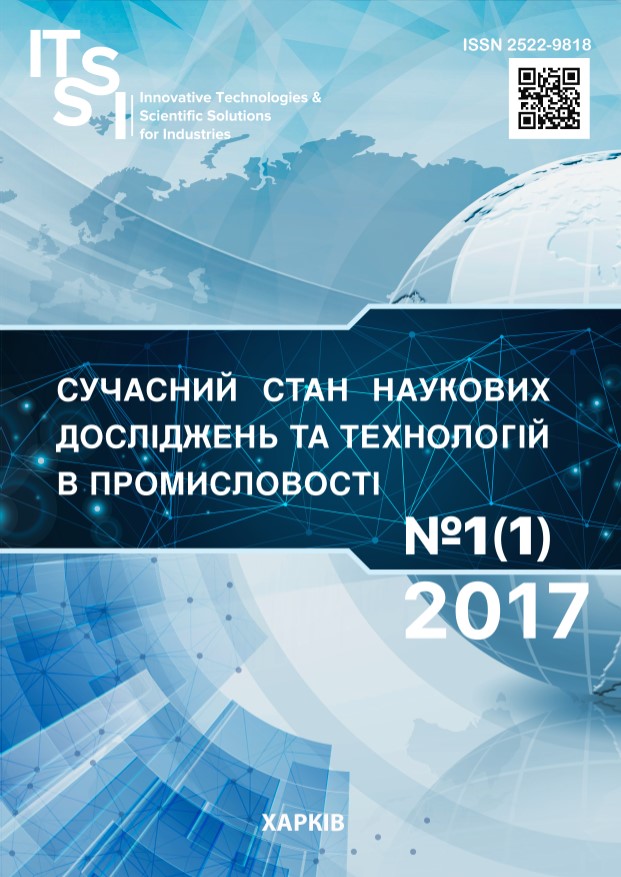МОДЕЛЬ ПІДТРИМКИ ПРИЙНЯТТЯ РІШЕНЬ ПРИ УПРАВЛІННІ ЦЕНТРАЛІЗОВАНИМ ТЕПЛОЗАБЕЗПЕЧЕННЯМ НА СТОРОНІ СПОЖИВАЧА
DOI:
https://doi.org/10.30837/2522-9818.2017.1.069Ключові слова:
енергозбереження, теплозабезпечення, модель, нечітка логіка, підтримка прийняття рішеньАнотація
Для ефективного управління централізованим теплозабезпеченням на стороні споживача необхідно впроваджувати систему енергетичного менеджменту як інструмент досягнення мети скорочення споживання енергетичних ресурсів шляхом їх раціонального використання. Впровадження системи енергетичного менеджменту потребує здійснення контролю, обліку, аналізу та прийняття рішень при управлінні системою теплозабезпечення. Предметом даного дослідження є інформаційне забезпечення підтримки прийняття рішень при управлінні централізованим теплозабезпеченням. Метою роботи є розроблення моделі підтримки прийняття рішень при управлінні режимами теплозабезпечення на стороні споживача. Задачі дослідження полягають у виборі методів, розробленні моделі формування рішення щодо управління режимами теплозабезпечення та реалізації її в системі підтримки прийняття рішень. Проведено аналіз сучасного стану застосування інформаційних технологій для розв’язання задачі підтримки прийняття рішень при управлінні централізованим теплозабезпеченням. Розроблено модель визначення регулюючого параметру для встановлення необхідного режиму теплозабезпечення з використанням методів теорії нечітких множин та нечіткої логіки. На основі експертного опитування визначено терм-множини лінгвістичних змінних моделі нечіткого логічного виведення рішення щодо управління режимами теплозабезпечення, побудовано функції належності кожної лінгвістичної змінної моделі та правила логічного виведення рішення. Результатом роботи моделі є рекомендація щодо регулювання поточного режиму теплозабезпечення, який може приймати значення "нижче за необхідний", "допустимий", "оптимальний", "перевищує оптимальний" до необхідного серед можливих значень "допустимий", "оптимальний" за температурних умов навколишнього середовища "дуже холодно", "холодно", "помірно" чи "тепло". Розроблену модель реалізовано в інформаційній технології підтримки прийняття рішень при управлінні теплозабезпеченням об’єктів соціально-бюджетної сфери. На основі цієї технології розроблено систему підтримки прийняття рішень,що забезпечує автоматизацію задач моніторингу поточного стану системи теплозабезпечення, оцінки прогнозованого обсягу споживання теплової енергії, а також підтримки прийняття рішень щодо управління теплозабезпеченням на стороні споживача. Використання розробленої моделі у складі системи підтримки прийняття рішень щодо управління теплозабезпеченням на стороні споживача дозволяє досягти зменшення рівня споживання теплової енергії на опалення будівель при збереженні необхідного температурного режиму в опалюваних приміщеннях.Посилання
Parfenenko, Yu., Shendryk, V., Nenja, V., Vashchenko, S. (2014), "Information System for Monitoring and Forecast of Building Heat Consumption", Communications in Computer and Information Science, Vol. 465, pp. 1−11, DOI: 10.1007/978-3-319-11958-8_1
Shendryk, V., Nenia, V., Aleksenko, O., Parfenenko, Yu. (2017), "Information supporting of decision making for energy management in district heating", Renewable and Alternative Energy: Optimum Decision Making in Asset Management, Chapter 14, pp. 310-333, DOI: 10.4018/978-1-5225-0651-5.ch014
Parfenenko, Yu. V., Nenia, V. G., Bondarenko, A. O. (2015), "Information technology for decision-making support in the management of centralized heating supply modes", Technology audit and production reserves, No. 1/2 (21), pp. 8−13, DOI: 10.15587/2312-8372.2015.37175
Dubovoj, V. M., Kabachij, V. V., Panochyshyn, Yu. M. (2005), Control and management of heat supply networks, UNIVERSUM-Vinnytsia, Vinnytsia.
Pakhomov, P. Y., Nemtynov, V. A. (2009), Technology of decision support in the management of engineering communications, Mechanical Engineering, Moscow.
Ratushniak, O. H. (2010), Content management of innovative projects of thermo-modernization of buildings, VNTU, Vinnytsia.
Bing, Yu. (ed.), Dolf, van Paassen (ed.) (2003), Proceedings of the Eighth International IBPSA Conference, Eindhoven. Rotshtein, A. P., Rakytyanska, H, (2012), "Fuzzy Evidence in Identification, Forecasting and Diagnosis", Studies in Fuzziness and Soft Computing, Chapter 1, pp. 1-37, DOI: 10.4018/978-1-5225-0651-5.ch014
Nesticky, M. (ed), Skulavik, T. (ed), Znamenak, J. (ed) (2017), Artificial Intelligence Trends in Intelligent Systems: Proceedings of the 6th Computer Science On-line Conference 2017 (CSOC2017), Springer International Publishing. DOI: 10.1007/978-3-319-57261-1_2
Kolokotsa, D., Diakaki, C., Grigoroudis, E., et. al. (2009), Advances in Building Energy Research, Vol. 3, pp. 121−146. DOI: 10.1007/978-3-319-11958-8_1
ISO 50001:2011, Energy management systems – Requirements with guidance for use, viewed 20 august 2017. Johansson, C. (2010), Towards Intelligent District Heating, Blekinge Institute of Technology, Karlskrona.
##submission.downloads##
Як цитувати
Номер
Розділ
Ліцензія
Авторське право (c) 2018 Yuliia Parfenenko

Ця робота ліцензується відповідно до Creative Commons Attribution-NonCommercial-ShareAlike 4.0 International License.
Наше видання використовує положення про авторські права Creative Commons для журналів відкритого доступу.
Автори, які публікуються у цьому журналі, погоджуються з наступними умовами:
Автори залишають за собою право на авторство своєї роботи та передають журналу право першої публікації цієї роботи на умовах ліцензії Creative Commons Attribution-NonCommercial-ShareAlike 4.0 International License (CC BY-NC-SA 4.0), котра дозволяє іншим особам вільно розповсюджувати опубліковану роботу з обов'язковим посиланням на авторів оригінальної роботи та першу публікацію роботи у цьому журналі.
Автори мають право укладати самостійні додаткові угоди щодо не комерційного та не ексклюзивного розповсюдження роботи у тому вигляді, в якому вона була опублікована цим журналом (наприклад, розміщувати роботу в електронному сховищі установи або публікувати у складі монографії), за умови збереження посилання на першу публікацію роботи у цьому журналі.
Політика журналу дозволяє і заохочує розміщення авторами в мережі Інтернет (наприклад, у сховищах установ або на особистих веб-сайтах) рукопису опублікованої роботи, оскільки це сприяє виникненню продуктивної наукової дискусії та позитивно позначається на оперативності та динаміці цитування опублікованої роботи.














